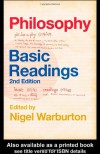Currently reading
Philosophy: Basic Readings
Against Method: Outline of an Anarchistic Theory of Knowledge
Arguably: Selected Essays
Philosophy of Science (Science & Mathematics) (Philosophy & Intellectual History)
David Mitchell: Critical Essays
 For those planning to start a good thriller, I suggest opting for another book to avoid possible disappointment. As a thriller, I would have rated it the impossible 2.5 stars. All the buzz about it being a good thriller and all the people talking about how it was impossible to put down made me imagine that when I'll read it one day, I'll experience an extraordinary thriller. I recently found myself in the mood of starting a thriller so I picked this up. As I went through, I was disappointed with the "thrilling" part.
For those planning to start a good thriller, I suggest opting for another book to avoid possible disappointment. As a thriller, I would have rated it the impossible 2.5 stars. All the buzz about it being a good thriller and all the people talking about how it was impossible to put down made me imagine that when I'll read it one day, I'll experience an extraordinary thriller. I recently found myself in the mood of starting a thriller so I picked this up. As I went through, I was disappointed with the "thrilling" part.As the mystery was unfolded somewhere around 80% of the book, I began wondering what more is to be expected from it. With all the thrillers I’ve read so far, I was somehow conditioned that once the mystery is solved, the book must be finished. Fortunately, that didn’t happen here and I’m sure enough Larsson deliberately made it that way to give us a last chance to appreciate more than the thriller in his book. Once the mystery was gone, along with my high expectations, I realized what Larsson wanted to write about.
The main story deals with misogyny, racism, rape, some religion, Swedish society along with other themes. I really enjoyed the environment where the events took place and wanted to be around such place. I’ve never been to Sweden, but Larsson’s prose, albeit sometimes lengthy and needless at places, made me really want to.
I read that Larsson witnessed a girl called Lisbeth being gang raped when he was 15 and felt bad for not helping the poor girl. I believe he wanted to redeem himself by writing the book and calling the main heroine Lisbeth, who is an unconventional person and a rape victim herself, and by calling the book "Men Who Hate Women" which is the name of the book in Swedish. As I went through the book, Lisbeth’s image began to change and she was gradually being accepted in society, and I realized her to be an ordinary person as everyone else in the book, able to love, hate, fight for what she believes and be very much of a conventional person and that’s what I loved most in the book.
Most characters were intelligent and believable. The story had some elements of recent history about Nazism and life in Europe at the time that I really enjoyed. Relationships between family members were in a way amusing, and with Larsson’s humor, they seemed to be somehow familiar.
One last point: Before each part of the book, the author has put a small statistic about women who underwent sexual assault in Sweden. While reading the numbers, I was really shocked.







